Resume
Tax Attorney Cover Letter Examples

May 29, 2025
|
12 min read
Master the art of crafting a compelling tax attorney cover letter with tips that make your qualifications stand out. Prevent common pitfalls and learn how to state your case like a pro, without getting into a tax tangle.
4.70 Average rating
Rated by 348 people
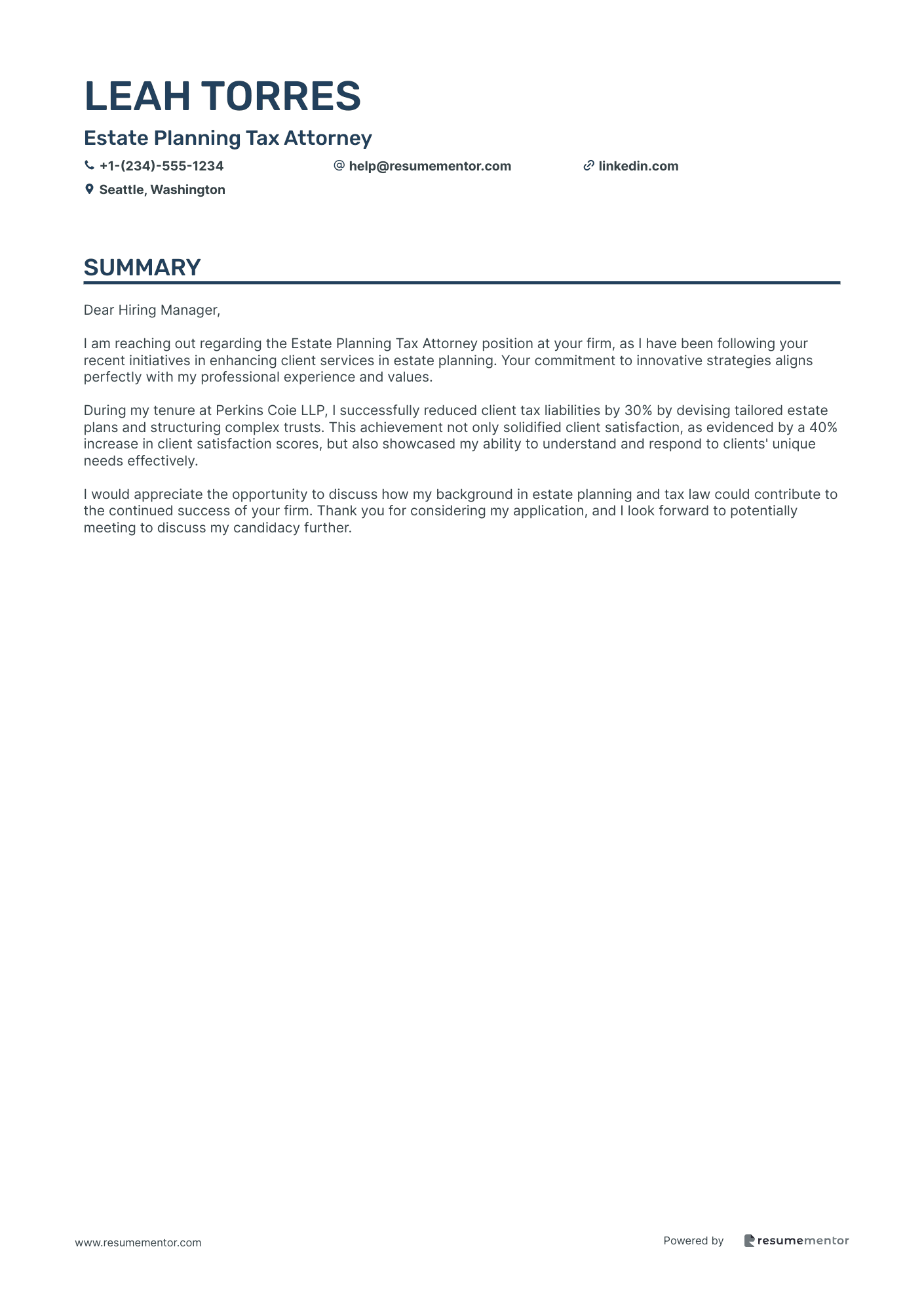
Estate Planning Tax Attorney
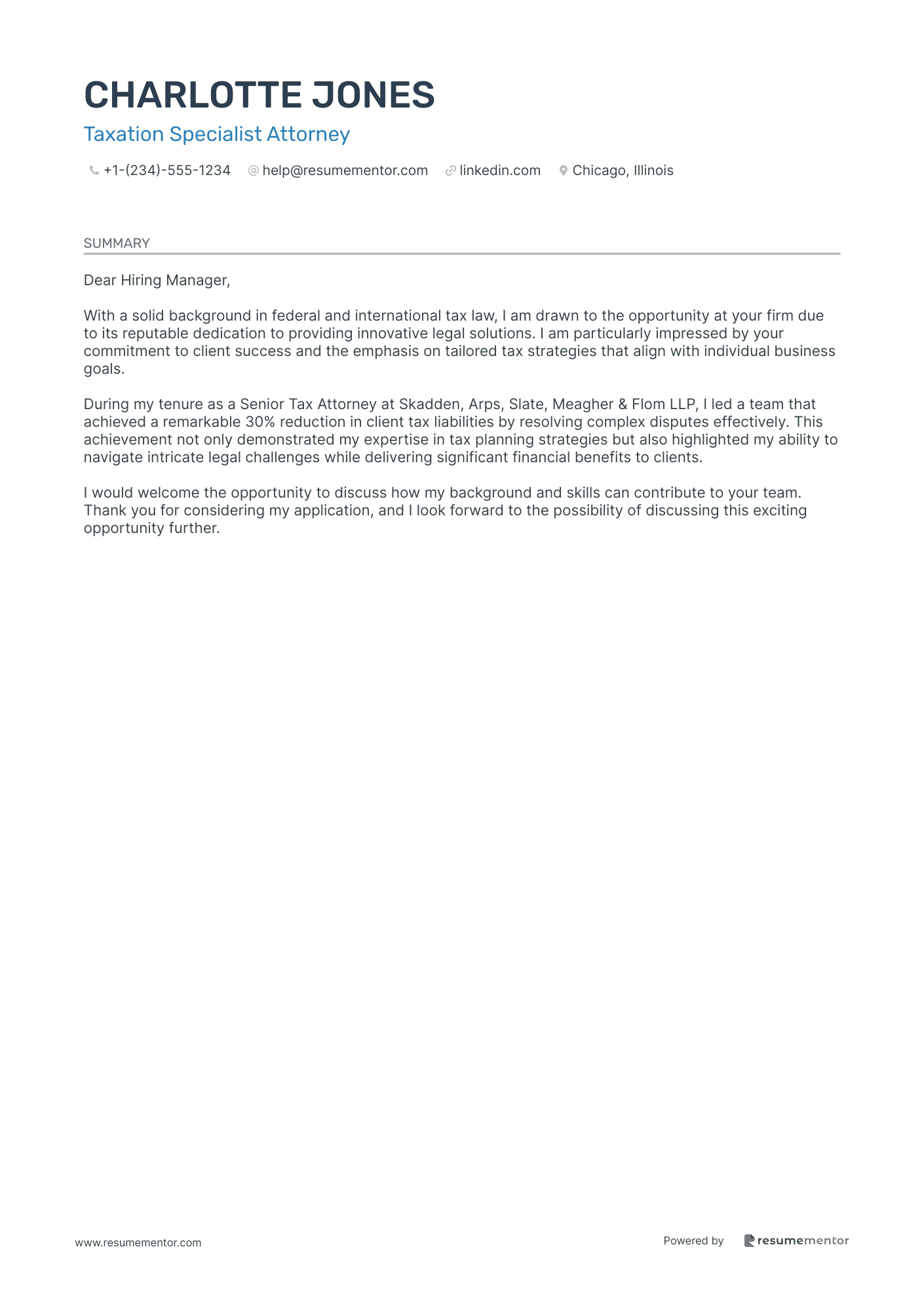
Taxation Specialist Attorney
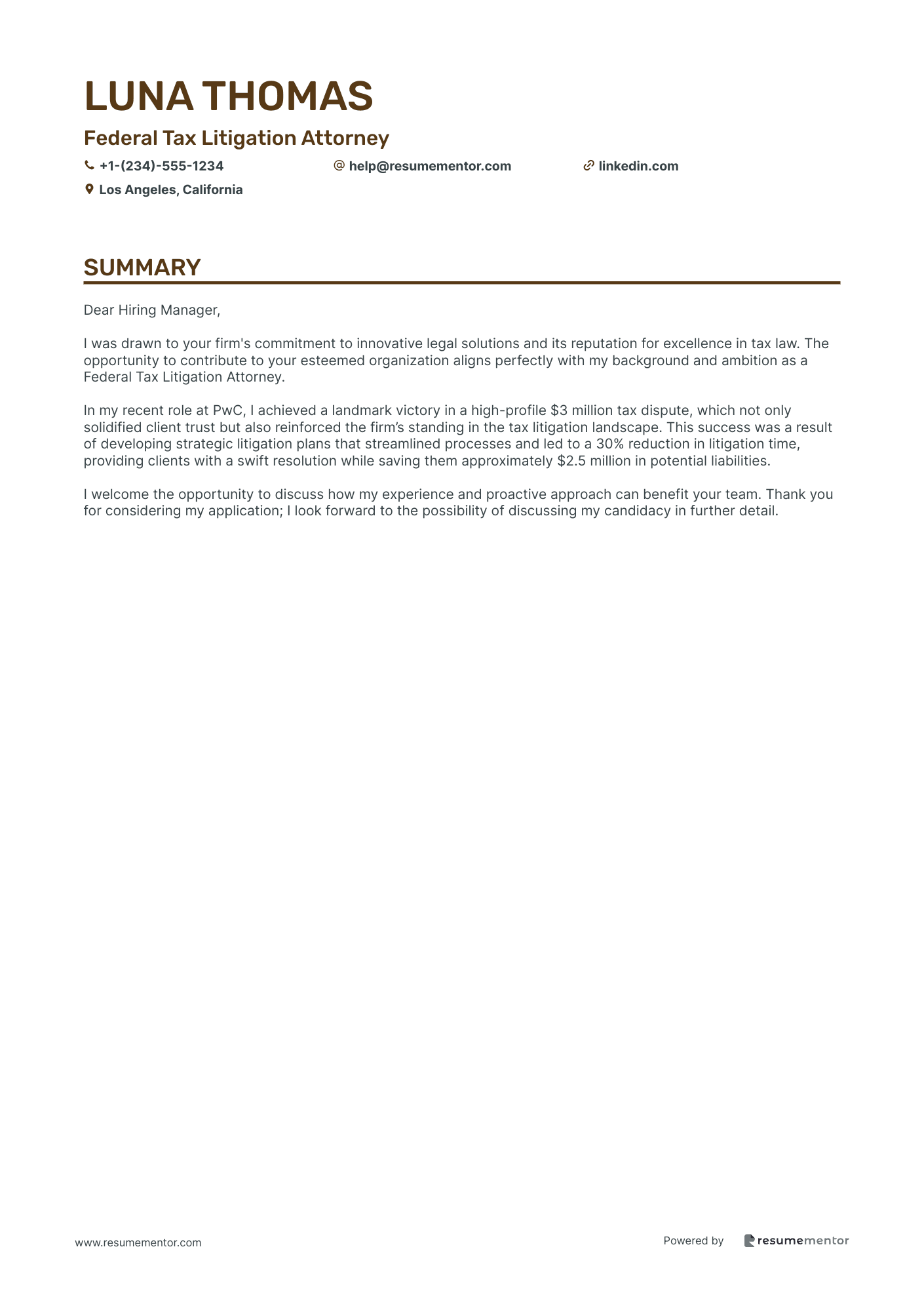
Federal Tax Litigation Attorney
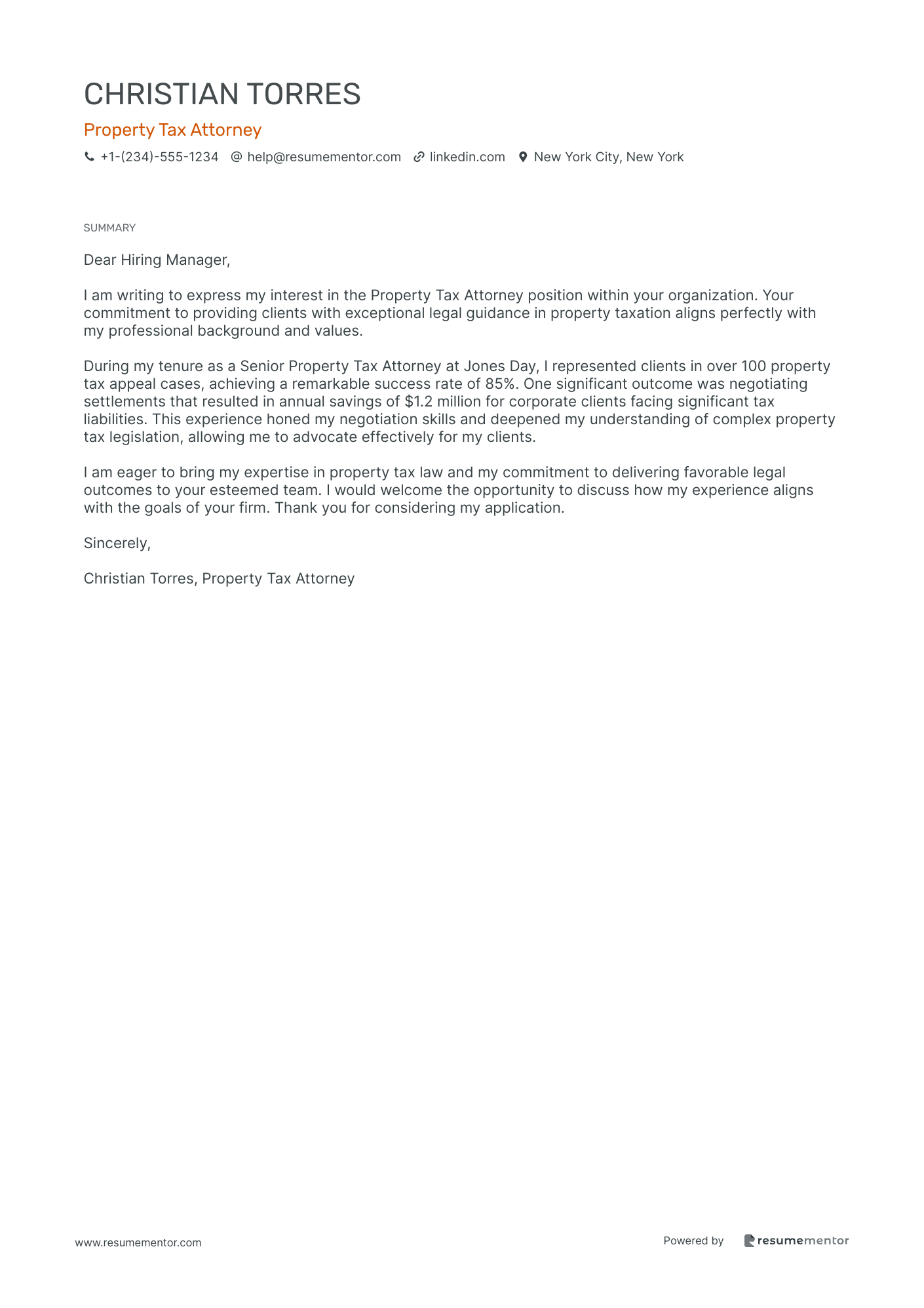
Property Tax Attorney
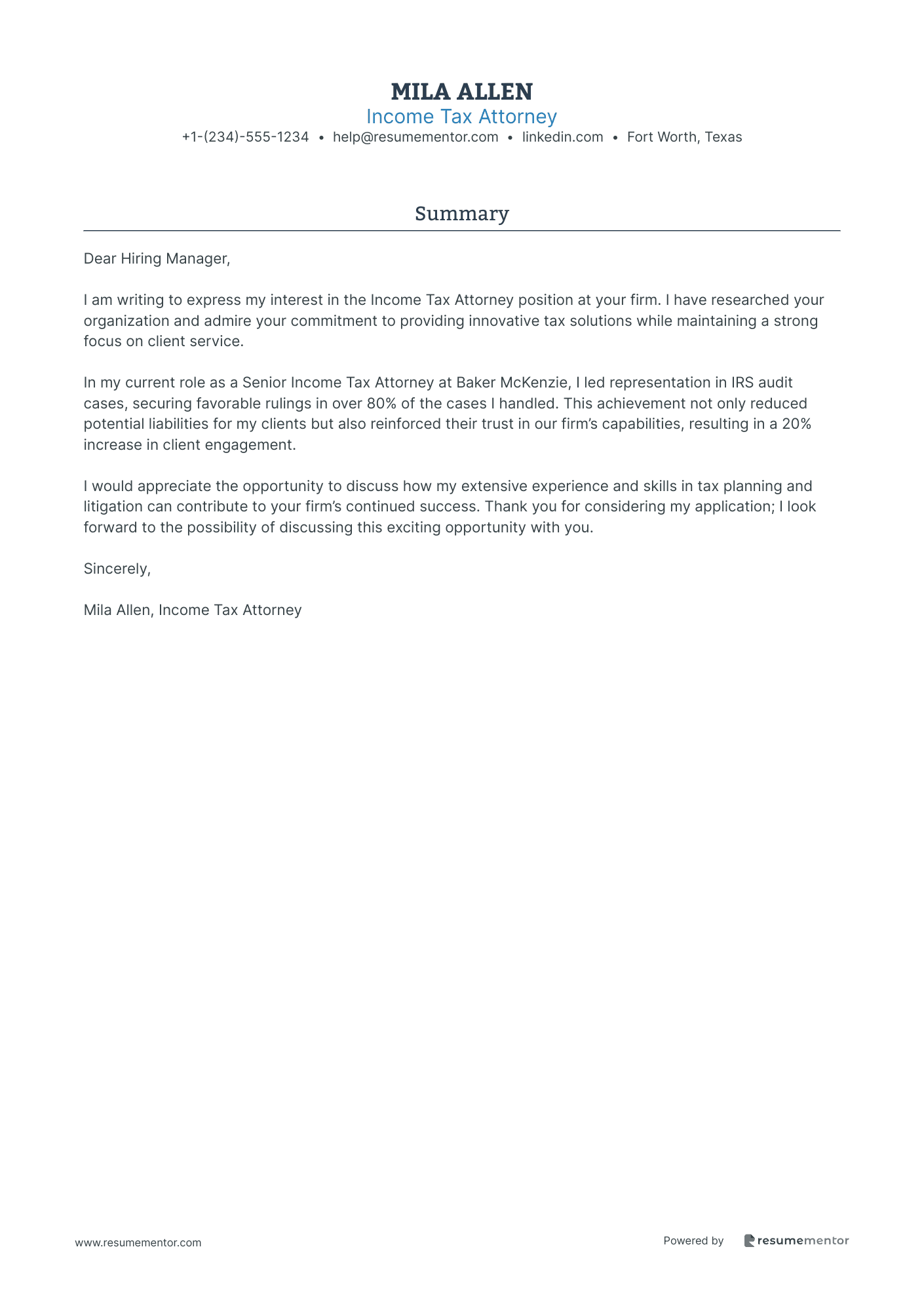
Income Tax Attorney
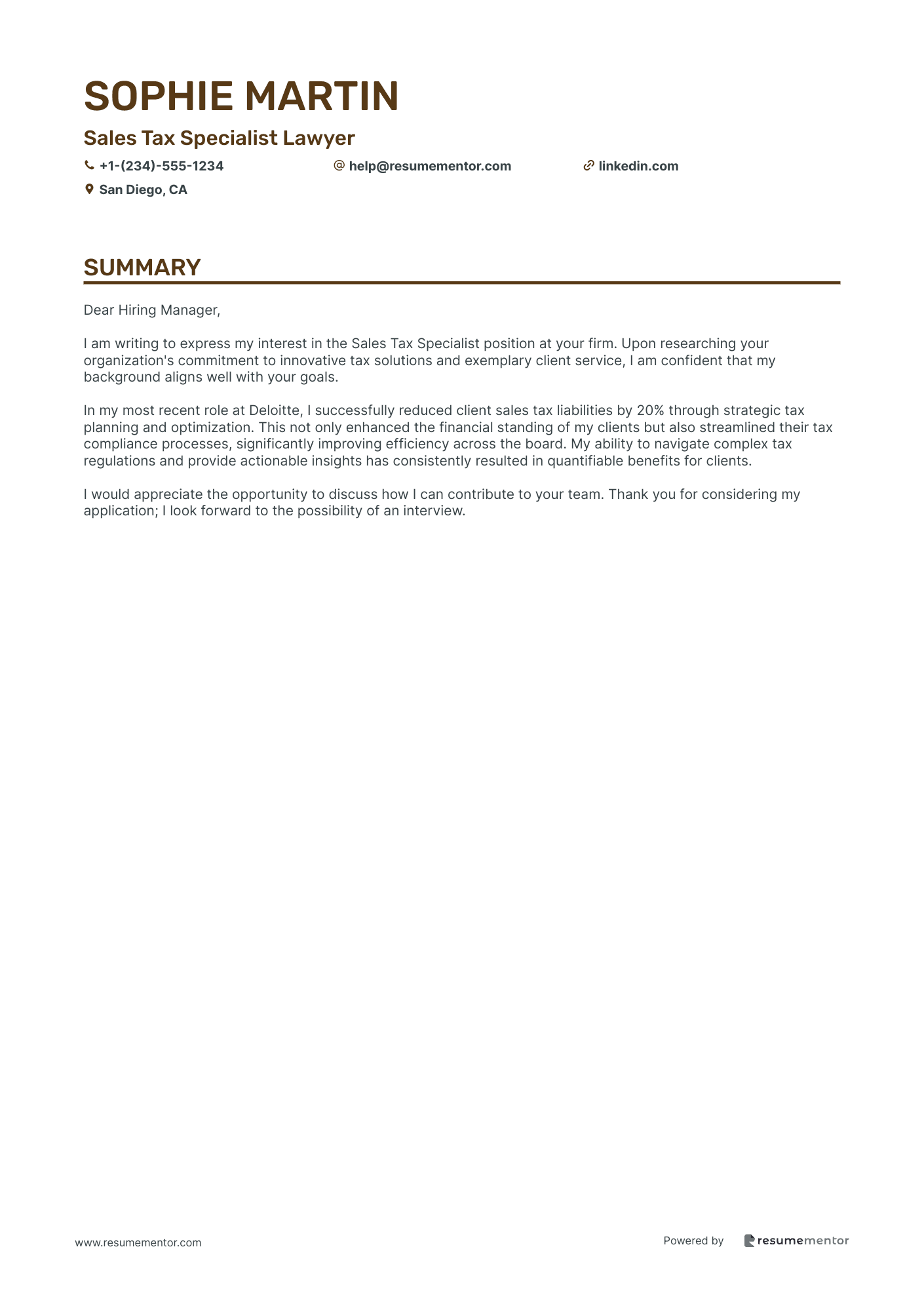
Sales Tax Specialist Lawyer
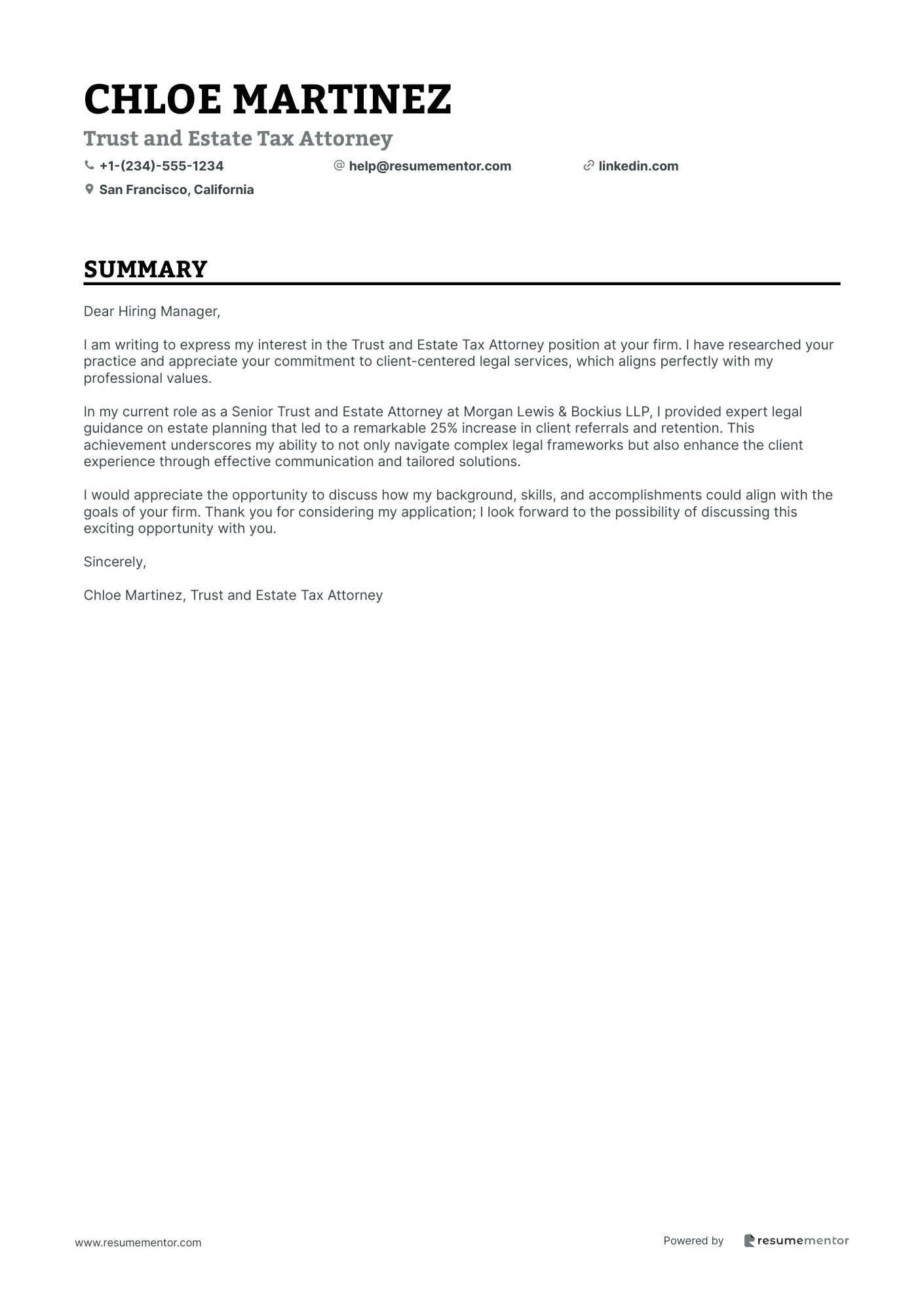
Trust and Estate Tax Attorney
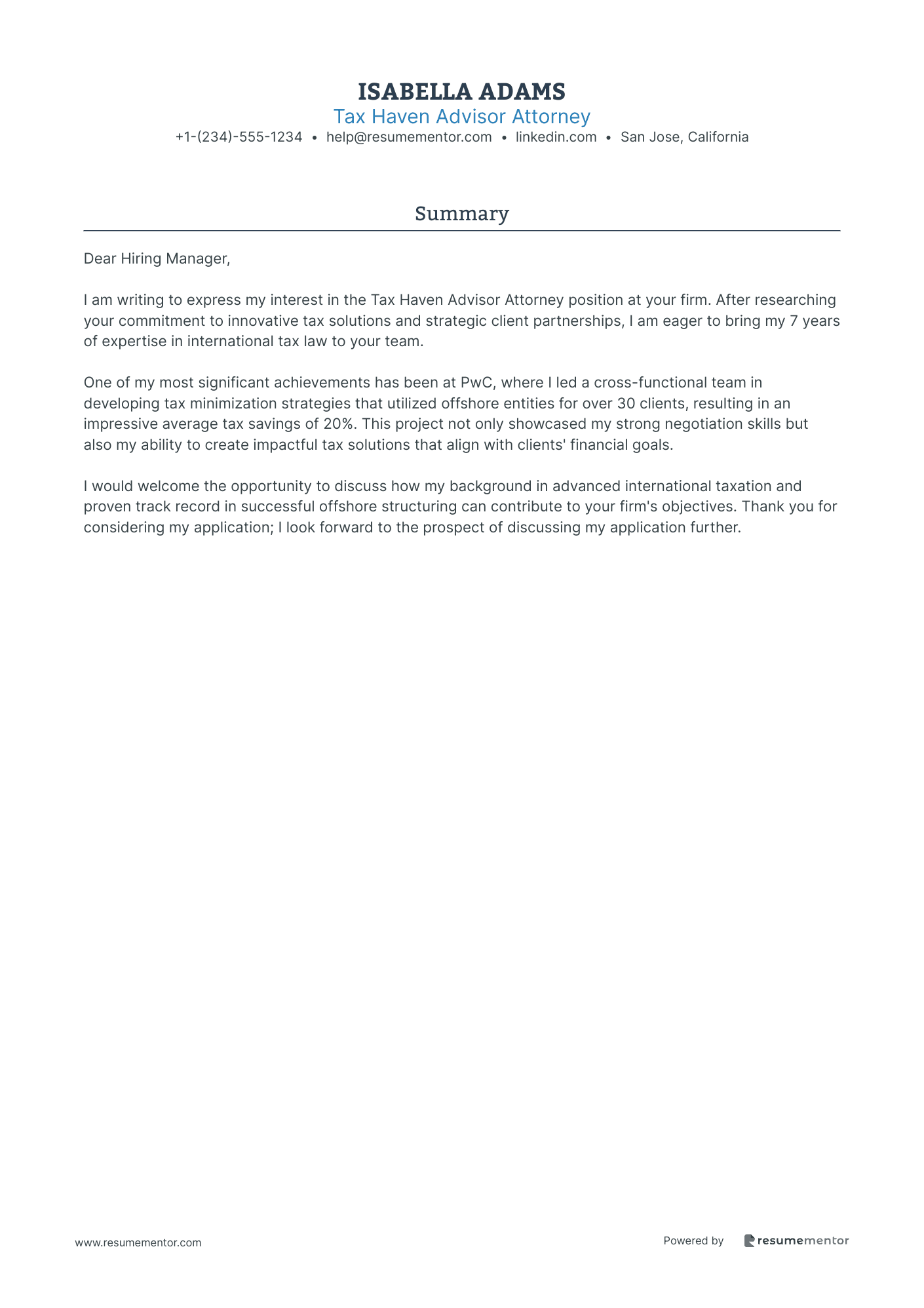
Tax Haven Advisor Attorney
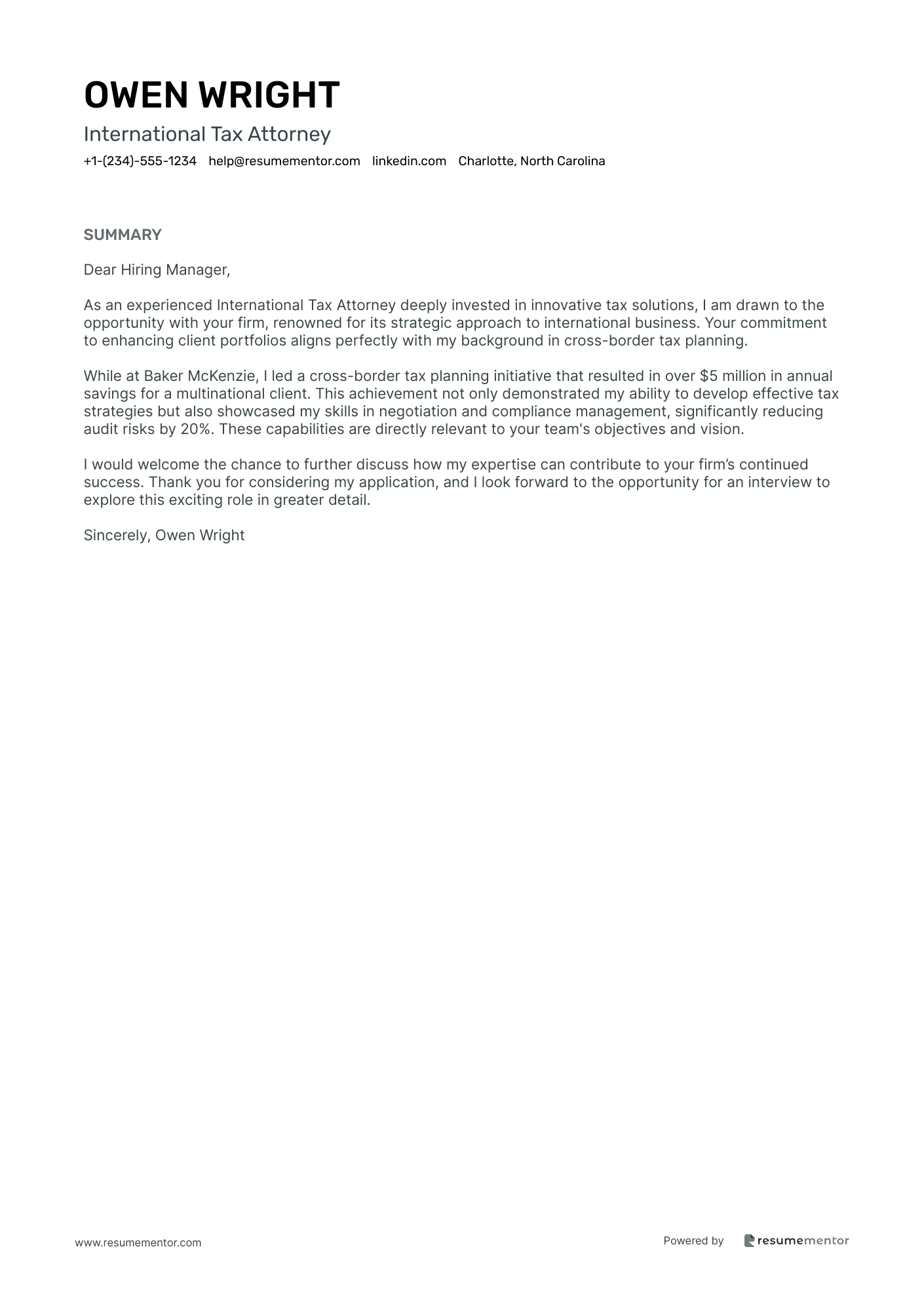
International Tax Attorney

Estate Planning Tax Attorney cover letter sample
When crafting your cover letter, prioritize your knowledge of tax laws and regulations related to estate planning. Highlight any relevant certifications, such as a Master of Laws (LL.M.) in Taxation. Emphasize your experience working with clients to create customized estate plans that minimize tax liabilities. Include specific examples of how your strategic advice has led to significant tax savings for clients. Use a ‘skill-action-result’ format to demonstrate how your expertise has benefitted clients and resolved complex estate situations effectively.
Leah Torres
Estate Planning Tax Attorney
Summary
Dear Hiring Manager,
I am reaching out regarding the Estate Planning Tax Attorney position at your firm, as I have been following your recent initiatives in enhancing client services in estate planning. Your commitment to innovative strategies aligns perfectly with my professional experience and values.
During my tenure at Perkins Coie LLP, I successfully reduced client tax liabilities by 30% by devising tailored estate plans and structuring complex trusts. This achievement not only solidified client satisfaction, as evidenced by a 40% increase in client satisfaction scores, but also showcased my ability to understand and respond to clients' unique needs effectively.
I would appreciate the opportunity to discuss how my background in estate planning and tax law could contribute to the continued success of your firm. Thank you for considering my application, and I look forward to potentially meeting to discuss my candidacy further.
Taxation Specialist Attorney cover letter sample
When applying for this position, it's important to focus on any previous experience in tax law or related fields. Highlight your understanding of tax regulations and compliance, as well as any successful cases you managed. Mention any certifications, such as CPA or bar admission, to demonstrate your qualifications. Use concrete examples that illustrate how your expertise has minimized liabilities or improved client outcomes. Following a 'skill-action-result' format can effectively showcase your impact and ability to navigate complex tax issues.
Charlotte Jones
Taxation Specialist Attorney
Summary
Dear Hiring Manager,
With a solid background in federal and international tax law, I am drawn to the opportunity at your firm due to its reputable dedication to providing innovative legal solutions. I am particularly impressed by your commitment to client success and the emphasis on tailored tax strategies that align with individual business goals.
During my tenure as a Senior Tax Attorney at Skadden, Arps, Slate, Meagher & Flom LLP, I led a team that achieved a remarkable 30% reduction in client tax liabilities by resolving complex disputes effectively. This achievement not only demonstrated my expertise in tax planning strategies but also highlighted my ability to navigate intricate legal challenges while delivering significant financial benefits to clients.
I would welcome the opportunity to discuss how my background and skills can contribute to your team. Thank you for considering my application, and I look forward to the possibility of discussing this exciting opportunity further.
Federal Tax Litigation Attorney cover letter sample
When applying, it’s important to showcase any previous experience in tax law or litigation. Highlight your analytical skills and attention to detail, as these are essential in this field. If you have participated in relevant training or professional development courses, such as tax procedures or dispute resolution, be sure to mention them. Provide specific examples of past cases where your strategies led to favorable outcomes. Use the 'skill-action-result' method to clearly demonstrate how your expertise has positively impacted previous clients or employers.
Luna Thomas
Federal Tax Litigation Attorney
Summary
Dear Hiring Manager,
I was drawn to your firm's commitment to innovative legal solutions and its reputation for excellence in tax law. The opportunity to contribute to your esteemed organization aligns perfectly with my background and ambition as a Federal Tax Litigation Attorney.
In my recent role at PwC, I achieved a landmark victory in a high-profile $3 million tax dispute, which not only solidified client trust but also reinforced the firm’s standing in the tax litigation landscape. This success was a result of developing strategic litigation plans that streamlined processes and led to a 30% reduction in litigation time, providing clients with a swift resolution while saving them approximately $2.5 million in potential liabilities.
I welcome the opportunity to discuss how my experience and proactive approach can benefit your team. Thank you for considering my application; I look forward to the possibility of discussing my candidacy in further detail.
Property Tax Attorney cover letter sample
When crafting your cover letter, be sure to highlight your experience in property law and your understanding of taxation policies. Showcase any successful case outcomes where you minimized tax liabilities for clients or secured favorable tax assessments. Mention relevant licenses, such as your bar admission, and any specialized training in tax law. Additionally, detail your research and analytical skills, illustrating how they've helped you navigate complex tax disputes. Make your application stand out by showcasing your commitment to continuous learning in the field and your ability to build client relationships.
Christian Torres
Property Tax Attorney
Summary
Dear Hiring Manager,
I am writing to express my interest in the Property Tax Attorney position within your organization. Your commitment to providing clients with exceptional legal guidance in property taxation aligns perfectly with my professional background and values.
During my tenure as a Senior Property Tax Attorney at Jones Day, I represented clients in over 100 property tax appeal cases, achieving a remarkable success rate of 85%. One significant outcome was negotiating settlements that resulted in annual savings of $1.2 million for corporate clients facing significant tax liabilities. This experience honed my negotiation skills and deepened my understanding of complex property tax legislation, allowing me to advocate effectively for my clients.
I am eager to bring my expertise in property tax law and my commitment to delivering favorable legal outcomes to your esteemed team. I would welcome the opportunity to discuss how my experience aligns with the goals of your firm. Thank you for considering my application.
Sincerely,
Christian Torres, Property Tax Attorney
Income Tax Attorney cover letter sample
When crafting your cover letter, focus on your experience with tax law, compliance, and legal research. Highlight your ability to analyze complex tax issues and develop strategic solutions. Any relevant certifications, such as a Master of Laws (LL.M.) in Taxation, should be emphasized for credibility. Share specific examples of cases where your legal expertise resulted in favorable outcomes for clients. Also, mention your strong attention to detail and communication skills, as they are essential for negotiating settlements and articulating legal arguments effectively.
Summary
Dear Hiring Manager,
I am writing to express my interest in the Income Tax Attorney position at your firm. I have researched your organization and admire your commitment to providing innovative tax solutions while maintaining a strong focus on client service.
In my current role as a Senior Income Tax Attorney at Baker McKenzie, I led representation in IRS audit cases, securing favorable rulings in over 80% of the cases I handled. This achievement not only reduced potential liabilities for my clients but also reinforced their trust in our firm’s capabilities, resulting in a 20% increase in client engagement.
I would appreciate the opportunity to discuss how my extensive experience and skills in tax planning and litigation can contribute to your firm’s continued success. Thank you for considering my application; I look forward to the possibility of discussing this exciting opportunity with you.
Sincerely,
Mila Allen, Income Tax Attorney
Sales Tax Specialist Lawyer cover letter sample
When applying for this position, emphasize your understanding of tax laws and regulations. Highlight any certifications or advanced degrees in tax law that demonstrate your expertise. Include specific experiences where you've successfully navigated complex tax issues or represented clients in disputes. Use examples to illustrate your analytical skills and attention to detail. Quantify your achievements, showing how your legal strategies have saved clients money or minimized risks. A clear demonstration of your negotiation experience in settlements or tax planning will strengthen your application.
Sophie Martin
Sales Tax Specialist Lawyer
Summary
Dear Hiring Manager,
I am writing to express my interest in the Sales Tax Specialist position at your firm. Upon researching your organization's commitment to innovative tax solutions and exemplary client service, I am confident that my background aligns well with your goals.
In my most recent role at Deloitte, I successfully reduced client sales tax liabilities by 20% through strategic tax planning and optimization. This not only enhanced the financial standing of my clients but also streamlined their tax compliance processes, significantly improving efficiency across the board. My ability to navigate complex tax regulations and provide actionable insights has consistently resulted in quantifiable benefits for clients.
I would appreciate the opportunity to discuss how I can contribute to your team. Thank you for considering my application; I look forward to the possibility of an interview.
Trust and Estate Tax Attorney cover letter sample
When preparing your cover letter, it's essential to emphasize your experience in estate planning and tax law. Highlight any relevant certifications, such as being admitted to practice in your state or membership in estate planning associations. Discuss your proficiency in navigating state and federal tax regulations, and provide examples of how you’ve successfully minimized tax liabilities for clients. Additionally, showcase your ability to communicate complex legal concepts clearly. Tailoring your approach using specific case studies can demonstrate your practical knowledge and contribute to making your application stand out.
Chloe Martinez
Trust and Estate Tax Attorney
Summary
Dear Hiring Manager,
I am writing to express my interest in the Trust and Estate Tax Attorney position at your firm. I have researched your practice and appreciate your commitment to client-centered legal services, which aligns perfectly with my professional values.
In my current role as a Senior Trust and Estate Attorney at Morgan Lewis & Bockius LLP, I provided expert legal guidance on estate planning that led to a remarkable 25% increase in client referrals and retention. This achievement underscores my ability to not only navigate complex legal frameworks but also enhance the client experience through effective communication and tailored solutions.
I would appreciate the opportunity to discuss how my background, skills, and accomplishments could align with the goals of your firm. Thank you for considering my application; I look forward to the possibility of discussing this exciting opportunity with you.
Sincerely,
Chloe Martinez, Trust and Estate Tax Attorney
Tax Haven Advisor Attorney cover letter sample
When applying for this role, it’s vital to showcase your expertise in tax law and financial regulations. Highlight any experience you have with international tax planning and compliance. Mention your understanding of different tax havens and their legal frameworks. If you have certifications such as a CPA or an LLM in tax law, include those to demonstrate your qualifications. Provide examples of strategies you’ve implemented that saved clients money or mitigated legal risks. Use a 'skill-action-result' format to clearly illustrate your impact.
Isabella Adams
Tax Haven Advisor Attorney
Summary
Dear Hiring Manager,
I am writing to express my interest in the Tax Haven Advisor Attorney position at your firm. After researching your commitment to innovative tax solutions and strategic client partnerships, I am eager to bring my 7 years of expertise in international tax law to your team.
One of my most significant achievements has been at PwC, where I led a cross-functional team in developing tax minimization strategies that utilized offshore entities for over 30 clients, resulting in an impressive average tax savings of 20%. This project not only showcased my strong negotiation skills but also my ability to create impactful tax solutions that align with clients' financial goals.
I would welcome the opportunity to discuss how my background in advanced international taxation and proven track record in successful offshore structuring can contribute to your firm's objectives. Thank you for considering my application; I look forward to the prospect of discussing my application further.
International Tax Attorney cover letter sample
When preparing your cover letter, focus on any previous experience with cross-border tax issues or international regulations. Highlight your proficiency in tax treaties and compliance frameworks. If you have attended specialized workshops or earned certifications in international taxation, be sure to mention these and their relevance. Provide examples of how your expertise has resolved complex tax problems or minimized liabilities for clients, using the 'skill-action-result' format. Demonstrating your analytical skills and attention to detail can set you apart from other candidates.
Owen Wright
International Tax Attorney
Summary
Dear Hiring Manager,
As an experienced International Tax Attorney deeply invested in innovative tax solutions, I am drawn to the opportunity with your firm, renowned for its strategic approach to international business. Your commitment to enhancing client portfolios aligns perfectly with my background in cross-border tax planning.
While at Baker McKenzie, I led a cross-border tax planning initiative that resulted in over $5 million in annual savings for a multinational client. This achievement not only demonstrated my ability to develop effective tax strategies but also showcased my skills in negotiation and compliance management, significantly reducing audit risks by 20%. These capabilities are directly relevant to your team's objectives and vision.
I would welcome the chance to further discuss how my expertise can contribute to your firm’s continued success. Thank you for considering my application, and I look forward to the opportunity for an interview to explore this exciting role in greater detail.
Sincerely, Owen Wright
Related Articles

Continue Reading
Check more recommended readings to get the job of your dreams.
Resume
Resources
Tools
© 2026. All rights reserved.
Made with love by people who care.
